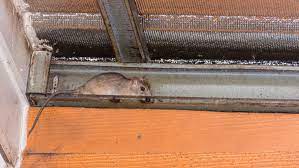The peacefulness of a quiet night’s sleep can be disrupted when you start hearing mysterious scratching sounds in your ceiling. It’s not uncommon for homeowners to experience this unnerving situation. In this article, we’ll explore the possible reasons behind those late-night ceiling scratches and what you can do to address the issue.

Understanding Nocturnal Ceiling Sounds
Before we dive into the potential causes of the scratching sounds in your ceiling, it’s essential to understand that this phenomenon is not uncommon. Many factors can contribute to these nighttime noises, and identifying the source is the first step to resolving the issue.
Possible Causes of Ceiling Scratching Sounds
- Pests and Rodents: One of the most common reasons for mysterious noises in the ceiling is the presence of pests or rodents. Rats, mice, squirrels, and even birds can find their way into your attic or ceiling space, creating havoc and leaving you with those unsettling sounds.
- Ductwork and Pipes: Your home’s ductwork and plumbing pipes often run through the ceiling and attic spaces. Expansion and contraction due to temperature changes can cause these pipes to make creaking or scratching sounds.
- Creaking of Building Materials: Homes settle and shift over time. The materials in your ceiling may creak or scratch as they expand and contract due to changes in temperature and humidity.
- Insects: Certain insects, like ants, termites, or beetles, can infest the wood in your ceiling. Their movement and feeding habits can produce faint scratching noises.
- Wind and Weather: Strong winds or weather changes can affect the exterior of your home. This can sometimes transmit sounds through the walls and into your ceiling.
Investigating and Resolving the Issue
If you’re hear scratching sounds in your ceiling at night, here are the steps to investigate and potentially resolve the issue:
Step 1: Identify the Source
Begin by trying to pinpoint the source of the sounds. Listen carefully and try to determine if the noises are consistent with the behavior of pests or animals. Look for any visible signs, like droppings or nests, to confirm if it’s a pest issue.
Step 2: Contact Pest Control
If you suspect pests or rodents, it’s essential to contact a pest control professional. They can assess the situation, set traps, and implement measures to remove the unwanted guests from your home.
Step 3: Inspect for Openings
Check for openings or gaps in your home’s exterior that might be providing access to these critters. Seal any gaps or cracks in the walls, roof, or attic to prevent them from reentering.
Step 4: Monitor the Situation
After addressing the possible pest issue, continue to monitor the situation. Sometimes, it takes a little time for all the animals to be removed from your home. Be patient and vigilant.
Step 5: Consult a Professional
If you can’t identify the source or if the noises persist even after pest control measures, consult a professional contractor or home inspector to assess the structural integrity of your ceiling and attic. They can determine if settling or other issues are causing the sounds.
Read too: Can I Sue My Landlord for a Leaking Ceiling? Exploring Your Legal Rights
Preventive Measures
To prevent future occurrences of ceiling scratching sounds, consider taking these preventive measures:
- Regularly inspect and maintain your home’s exterior, including the roof and attic.
- Install mesh or wire screens over openings like vents and chimneys to keep pests out.
- Keep trees and branches trimmed away from your home to prevent animals from accessing your roof.
- Ensure your attic and ceiling spaces are well-insulated and sealed to prevent drafts that can amplify sounds.
Conclusion
Hear scratching sounds in your ceiling at night can be unsettling, but it’s essential to investigate the source and take appropriate action. Whether it’s pests, settling building materials, or other factors, identifying and addressing the issue will help you restore the peace and quiet of your home.